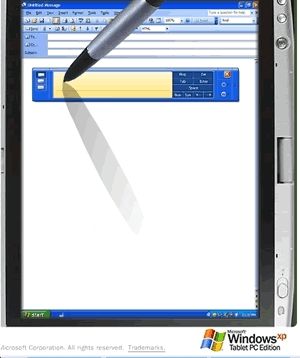Gizmogirl is a fan of tablet PCs so she was keen to try out Windows XP Tablet PC Edition 2005, Microsoft's free system upgrade. We tested it on Hewlett Packard's Tablet PC TC1100.
Software has been the Achilles' heel of tablet PCs compared to their brilliant hardware design. HP's tablets use a rotating screen to convert between writing slate and mini-notebook formats, which is the more versatile and better design. Rotate the screen on HP's tablet so it sits above the keyboard and you have a mini-notebook PC. Swivel the screen closed (or detach the keyboard) and you have a slate that you can write on using the electronic pen. Tablets offer fantastic portability. HP's TC1100 can be picked up and carried around easily. It sits neatly on a desk and takes up the space of a book, not a computer. The low voltage processor needs very little cooling so the computer is dead quiet to use: only occasional humming when you want to work in peace and quiet.
In theory, tablet PCs are more versatile than standard computers. In practice, their versatility depends on Microsoft's software. Earlier versions have made a meal of accurately converting handwriting to text, especially if you are taking notes with telephone numbers, post codes, URLs and email addresses. Not everyone has found the handwriting software problematic. Children with their slow print have been at a big advantage over adults in our tests, which makes tablets the best choice for young families choosing a PC to support literacy. Would Microsoft's free upgrade work any better for grown up, untidy writers?
Included in the upgrade are a redesigned input panel, better handwriting recognition, inplace correction and more integration with Microsoft's Office programs. The old input panel that used to sit annoyingly at the bottom of the page has changed. The redesigned in-place TIP (Tablet Input Panel) lets you open the input box just below where you are working. As you annotate documents by hand or using the onscreen input keyboard, the input area automatically adds space as you reach the end of the line. Handwriting is converted to text in a preview window, which gives you the chance to check it before adding it to your document. We found the handwriting recognition was much improved. Most importantly, there is contextual awareness. Noting down things like postcodes using the electronic pen and then converting script into text caused confusion. Now the operating system has contextual awareness so instead of trying to convert numbers to letters in postcodes, it understands the context and translates the mix more accurately. We also seemed to have fewer nonsensical words because Microsoft has improved the spelling tool type function.
HP's model numbers PK225AA and PK226AA have the software upgrade preloaded or tablet owners can download it free from Microsoft's website.
Our quick take
In many ways computers are out of step with childhood but if you are going to buy a machine for a young child, make it a tablet PC. In our tests, children much preferred this type of computer and Microsoft's upgrade has improved the product even further. For enjoyment and gaining confidence with writing, the electronic pen is a very powerful tool. It gives children a huge productivity boost. Seeing script converted in a flash into a professional block of text is empowering. Tablets also demand less conformity which suits children. You can take HP's tablet to bed and doodle or for serious work, set it up like a notebook on your desk. For older children, HP's wireless technology integrates with school networks and not having to carry CD/DVD drives to and from makes sense.

Windows XP Tablet PC Edition 2005 - 4.5 / 5
| FOR | AGAINST |
|---|---|
|
|
To recap
If budget is not your first consideration, tablet PCs are the best choice for young families buying a computer to support literacy.
